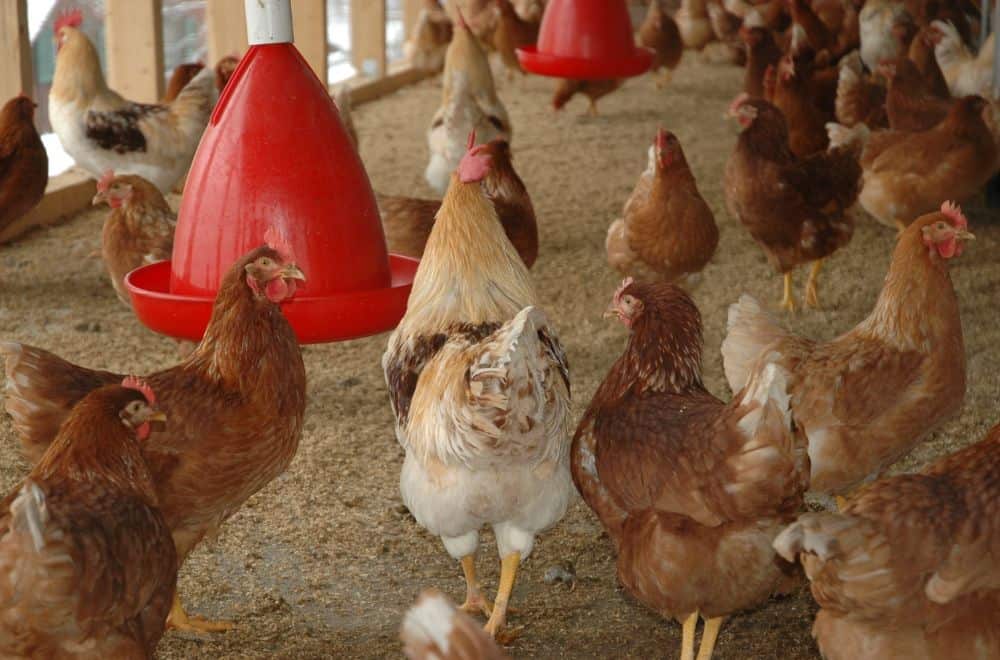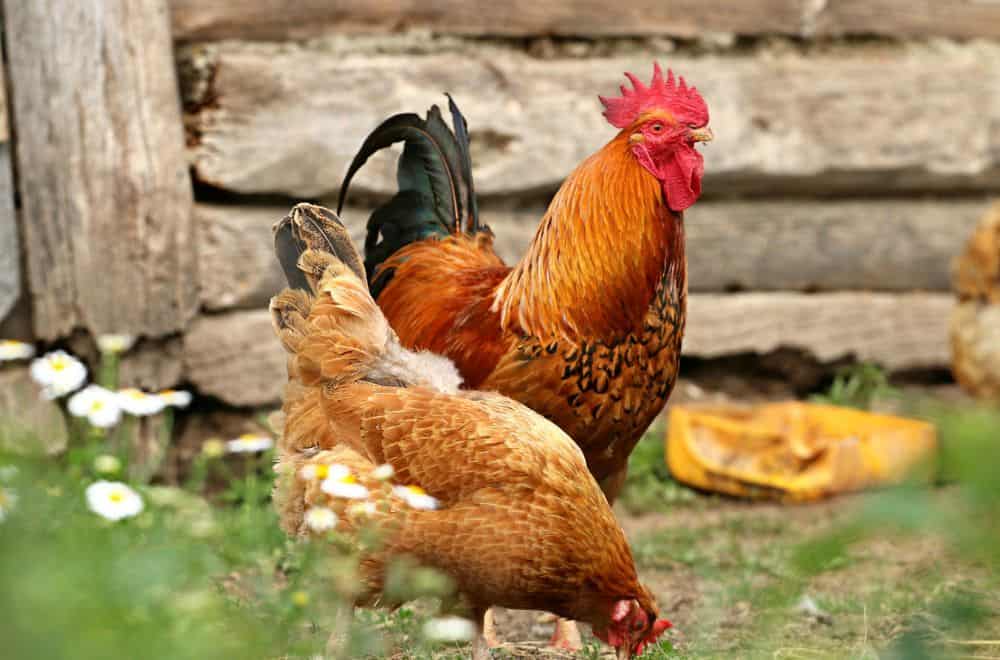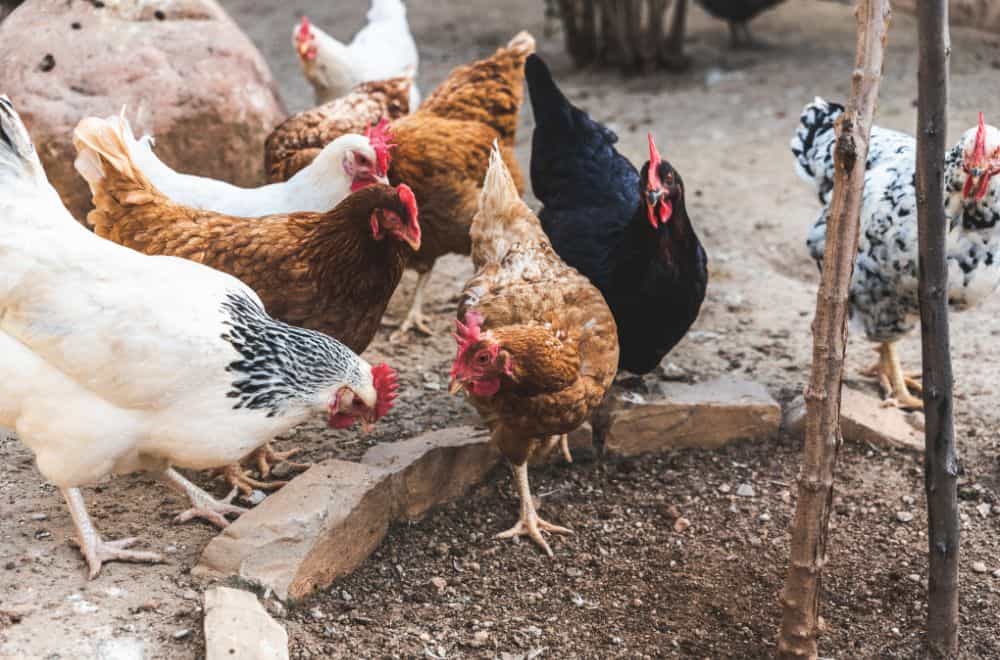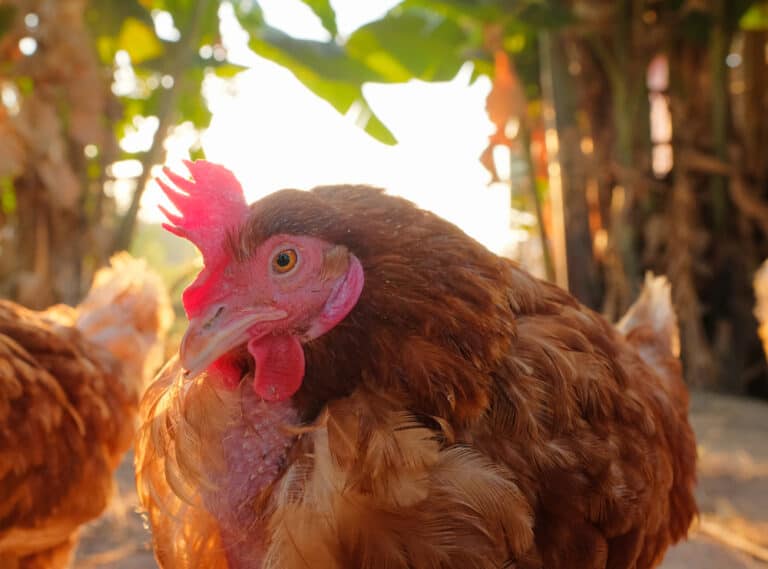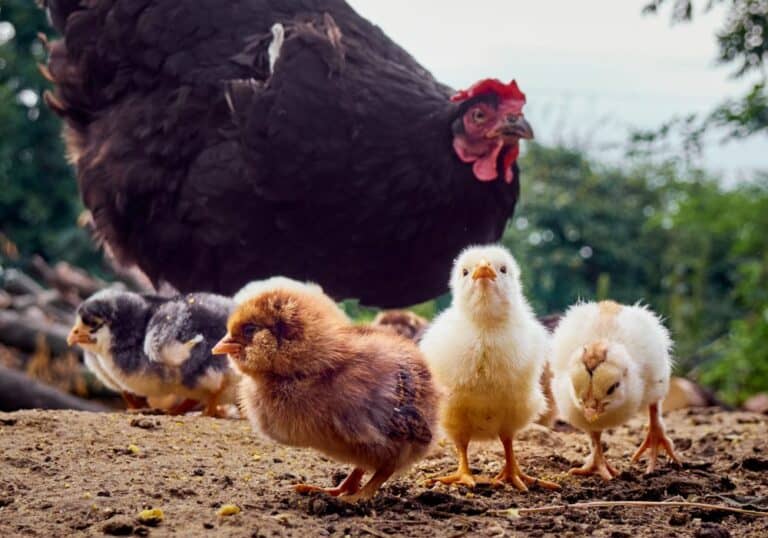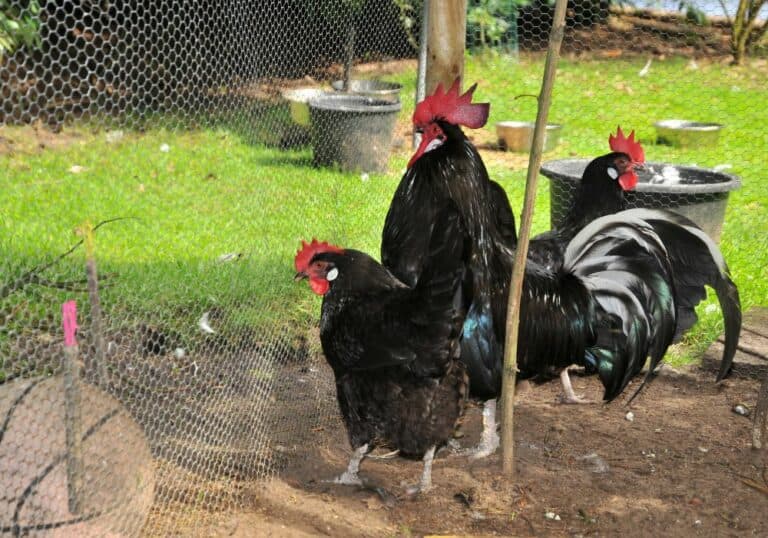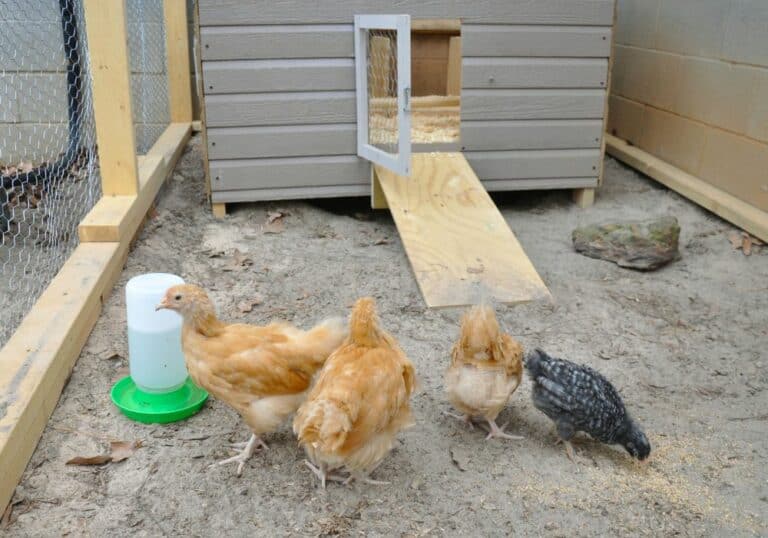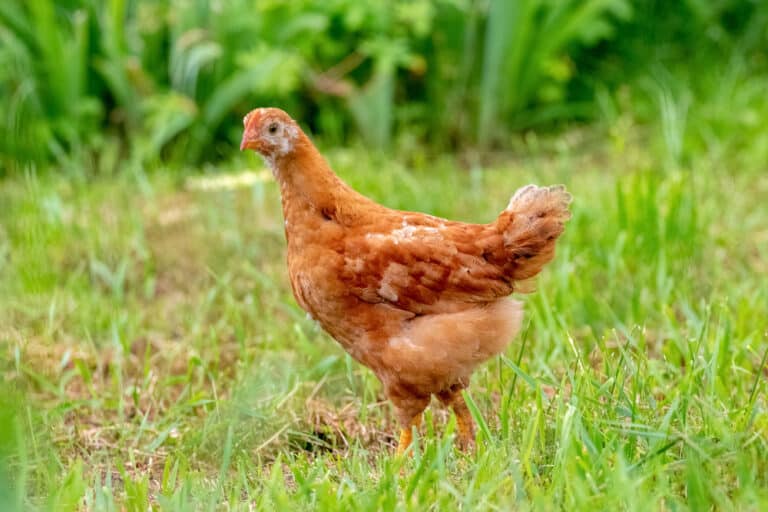Most novices in chicken breeding are confused with a lack of pee traces in the yard. So, the question do chickens pee or urinate is one of the mysteries you should solve. It is crucial to understand that birds, including chickens, have a different physiology than mammals.
Even though poultry has kidneys, they don’t have a bladder to store urine. Therefore, chickens never release it like your cat or dog. Instead, their bodies eliminate it along with poop. Let’s see.
Ways Chickens Release Their Urine
Like other birds, your chickens won’t urinate the same way as mammals, including humans, and you will never notice urine streams coming from their urogenital tract. The reason is their bodies’ anatomy and the absence of a urinary bladder.
In other words, birds have only kidneys as primary organs in their excretory system. They fulfill three functions including:
Electrolyte balance management – Chickens’ bodies need valuable nutrients, vitamins, and minerals in the required amounts. It is particularly crucial when poultry is under stress, or the weather is inappropriate. In such cases, their bodies tend to lose nutrients while the kidneys maintain the necessary balance.
Sustaining the water level – Maintaining the necessary water level in chickens’ bodies keeps them safe from dehydration and prevents their death. The thing is that water binds electrolytes, allowing the body to function smoothly.
Removing metabolic waste – Kidneys remove waste left after metabolic processes in the chickens’ bodies. The most harmful by-products are:
- Carbon dioxide
- Nitrogen compounds
- Sulfates
- Phosphates
- Excessive water
This metabolic waste is unusable, and its accumulation damages poultry bodies and prevents them from regular functioning. Chickens’ bodies excrete it as water-insoluble uric acid.
Some believe chickens urinate through the skin, but it is a myth. When looking carefully, it is possible to see uric acid crystals looking like white paste incorporated in their droppings. It represents a chicken’s version of pee.
Since such combined feces and urine contain a high nitrogen level, you can use them as an excellent fertilizer.
Chickens’ bodies excrete undigested food and liquid waste products together through the cloaca. You can say that poultry urinates in combination with defecation, so separating their pee from poop is impossible.
Keep in mind that the cloaca is a versatile multi-purpose opening for excretion, laying eggs, and receiving sperm. That is a reason why eggs are sometimes stained with poop.
How Often Do Chickens Pee and Poo?
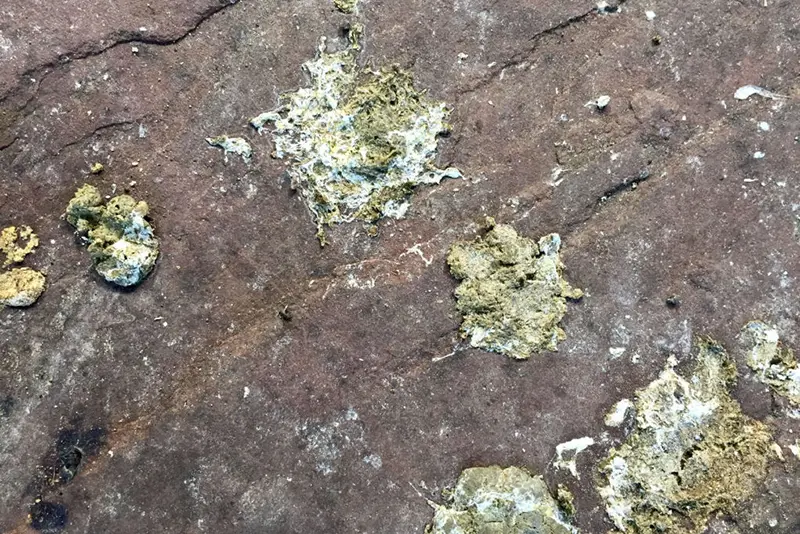
One of the crucial things is to determine how often chickens pee and poo so that you can organize excretion removal properly. You should check for a few factors to get an answer to this.
For instance, breed size directly affects the excretion amount your chicken produces daily. The rule of thumb is that more sizable poultry poop less often than smaller ones.
While average-sized breeds poop once every 20 to 25 minutes, smaller chickens release waste every ten minutes on average, but in smaller amounts. In other words, you can expect adult chickens to pee and poop at least 20 to 48 times a day, including a few times at night.
Be prepared that only one laying hen can produce 2 cubic feet (56.6 l/15 US gallons) of manure annually. So, you can count on 3 feet (0.9 m) wide, 3 feet (0.9 m) long, and 2 feet (0.6 m) tall pile every year if you have a flock of only ten chickens.
Chicken Droppings Appearance
Since pee and poop are the same excretions in chickens, you should consider their look as one. The positive thing is this duality simplifies taking care of their health, and only a quick look at their droppings can tell you about possible health issues.
Never panic when noticing atypical poop coloration and texture since they depend on various factors, including:
- Breed
- Age
- Diet
- Health
- Season
- Poop type (regular, cecal, broody)
Poultry feces are usually tan to brown, with a fluffy whitish cap on top representing urine. Its consistency depends on the food digestion level and is solid in healthy chickens. Possible deviations include:
Clear and watery droppings
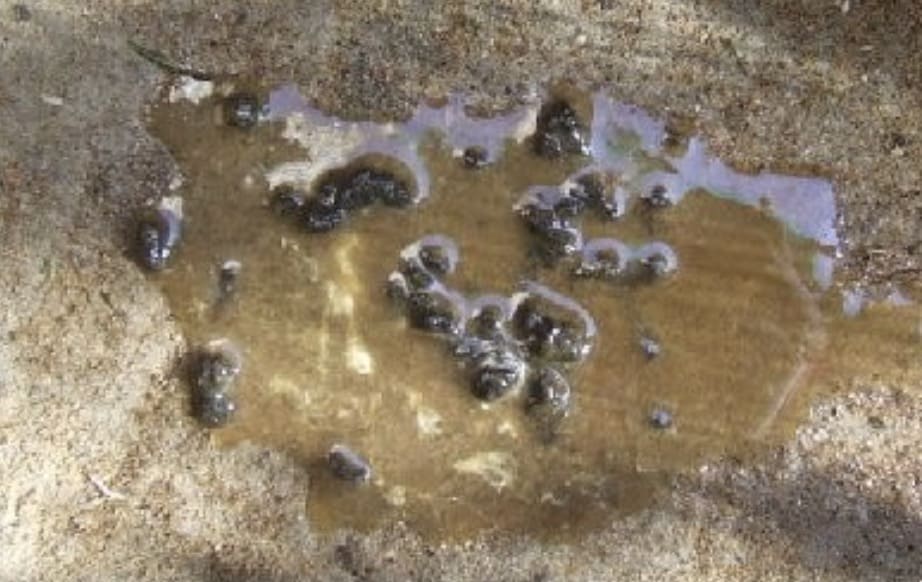
This poop type is perfectly expected during hot summer days when poultry increases their water intake. You can see the same result when offering your chickens iceberg lettuce, cucumbers, celery, or watermelon.
On the other hand, it may indicate that chickens are hungry for a long or under stress after a long transportation. In the worst case, they suffer from a kidney misfunction because of a long-term diet containing too-high protein.
Foamy, yellowish droppings
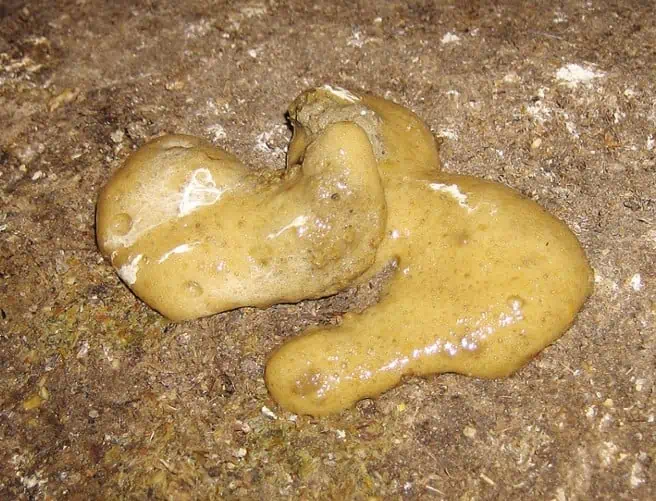
Yellow coloration of droppings results from a diet with predominantly corn content. Sometimes, forsythia blossoms and strawberries intake cause this poop shade. Unfortunately, unnaturally yellow stool is a symptom of coccidiosis, fowl typhoid, worm infestation, or kidney malfunction.
Green droppings
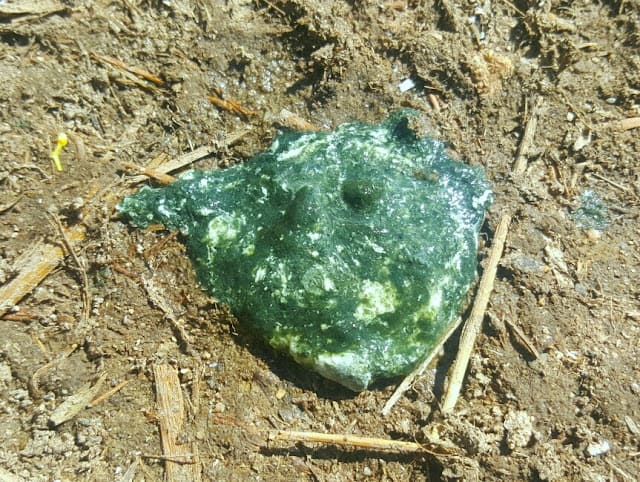
Green poop color is never natural and is often a symptom of diseases like Marek’s disease, Newcastle disease, avian flu, or worm infestation. In rare cases, starvation and excessive grass, weeds, or veggie consumption may result in the greenish stool.
Milky or white droppings
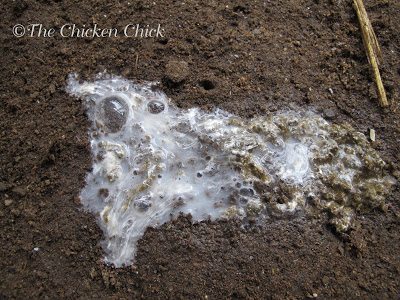
There is no harmless reason for this feces appearance. If you notice these droppings, the cause is always one of three possible infections, such as:
- Pullorum
- Internal worms (Bacillary white disease)
- Infectious bursal disease (Gumboro disease)
Whatever the reason for white poop is, it requires immediate vet attention and timely treatment.
Black droppings
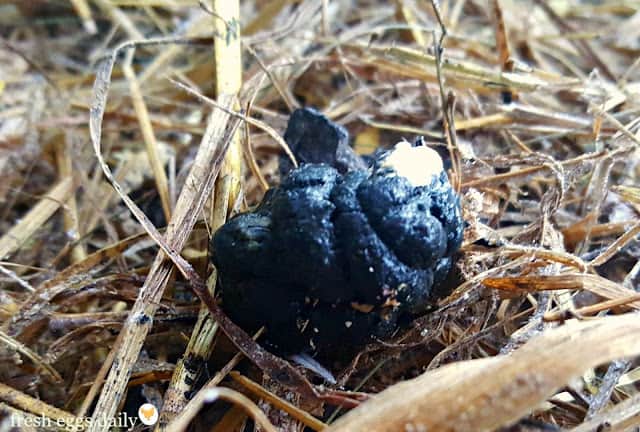
This droppings coloration often indicates the blood presence due to internal bleeding. Bloody poop is also a symptom of coccidiosis when followed by poor appetite and noticeable weight loss.
Before panicking, check the recently consumed food. Gray, blue, and black ingredients, like blackberries, wood ash, and charcoal, may cause the same poop appearance.
Runny brown droppings

Runny brown poop is alarming because it almost always indicates infectious bronchitis or Escherichia coli in chicken guts. Check your flock droppings during the day, and consider yourself lucky if it stops looking like that within several hours. In this case, the reason is excessive water intake.
Urinary Problems Prevention
Thanks to a unique excretion system, chickens may suffer from specific health issues. Therefore, you should give your best to prevent urinary problems in your poultry in a few ways.
Proper hydration
Chickens need to be adequately hydrated since it is the only way for their kidneys to eliminate excess uric acid and toxins from their bodies. You can offer them water with food a few times a day, but the better option is to provide free access to a poultry drinker.
Proper diet
The food type you offer to your chickens significantly impacts their kidneys. Therefore, you should stick to balanced feed specifically prepared for poultry. Never overdo snacks, provide enough water, and follow the required feeding schedule.
Avoid high-protein diet
A high-protein diet is not ideal for chickens since it increases uric acid production. Regular consumption of such food often causes potentially fatal avian gout over time. It is a metabolic condition followed by abnormal uric acid and urate accumulation in soft tissues.
Laying pellets
Laying pellets are highly convenient for hens, but you shouldn’t use them for the whole flock. The problem is that they contain excessive nutrients, like protein and calcium, crucial for laying hens. Although they are a part of everyday diet and are beneficial for poultry in recommended amounts, too high levels can damage their kidneys.
Vent Gleet
Vent gleet (pasty butt) is a condition specific to chickens that occurs when they paste butts with feathers, fecal material, and dirt. Sometimes, it is a result of bacterial infection. Whatever the reason is, chickens may have an issue with pooping and peeing and require help.
Be careful with this condition since it prevents the cloaca from adequately functioning, resulting in a problem with fecal excretion and egg release. The symptoms that should warn you something is wrong include:
- Swollen abdomen
- Inability to poop
- Lack of egg production
- Smelly, loose, and bloody feces
Once you notice chickens with this problem, taking a few steps to solve it is recommended.
Quarantine – Isolate chickens with vent gleet to reduce stress, clean them, and give them time to recover. It is also a way to keep them away from healthy poultry in case of infection.
Body hygiene – Gently clean the chicken’s backside with a damp cloth until removing all the dirt. Be prepared that neglected cases require the vet’s help.
Coop washing – Thoroughly clean the space where your chickens spend nights and most of the time. Wash or change dirty nesting boxes, change the old bedding, and remove dirt and chicken droppings.
Prevention – It is possible to prevent this condition by adding white vinegar to drinking water. The dose is one teaspoon of vinegar per 1 gallon (3.8 l) of water.
Consult a vet – If you do everything possible to help your poultry but without visible results, it is time to ask for professional help.
Summary
Even though you have never seen poultry pees, that doesn’t mean your chickens never do it. On the contrary, they urinate but have a different urinary system than other domestic animals and can’t release urine the same way.

